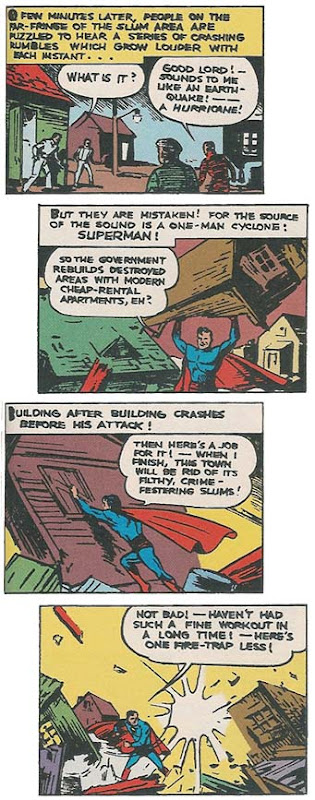When Superman Was a Leftist
On this Super Tuesday, Oz and Ends takes a look at super-politics: the politics of Superman in Jerry Siegel and Joe Shuster's earliest comic-book stories. In those months, Superman was not only opposed to criminals, he was also fighting against heartless capitalists and lending his hand to social reforms.
The Superman story from the third issue of Action Comics #3, dated August 1938, starts with the caped hero racing to the scene of a mine disaster. The next day, Clark Kent interviews an injured worker. That man has poor English and a foreign name, but, remarkably for popular literature of the time, he's not a comic or villainous figure. He's the sympathetic victim of the mine's managers. That evening Superman takes the guise of a miner and visits the mine's owner, who has the upper-class name Thornton Blakely. He's hosting a swell society party, and decides that nothing could be more entertaining than to have his beefy worker escort him and his guests underground to explore the mine.
That evening Superman takes the guise of a miner and visits the mine's owner, who has the upper-class name Thornton Blakely. He's hosting a swell society party, and decides that nothing could be more entertaining than to have his beefy worker escort him and his guests underground to explore the mine. Once underground, Superman triggers an accident, trapping the celebrants. Blakely finds that he's let the mine's safety device rust away. He and his rich friends dig for their lives, but collapse. Finally, Superman brings the socialites back to the surface, and Blakely promises to improve working conditions at all his mines.
Once underground, Superman triggers an accident, trapping the celebrants. Blakely finds that he's let the mine's safety device rust away. He and his rich friends dig for their lives, but collapse. Finally, Superman brings the socialites back to the surface, and Blakely promises to improve working conditions at all his mines.
It's hard to escape the class-consciousness of this story, especially with awkward but meaningful phrasing like "sable-and-evening-clothes-clad party-goers."
That attitude toward the rich makes a particularly strong contrast to the Batman comics that DC started to publish shortly afterward. Not only was Bruce Wayne a lazy socialite, but he spent a lot of his time as Batman rescuing threatened investors and thwarting jewel thieves--i.e., looking out for the upper class.
There's more super-politics in Action #8, dated January 1939. After meeting and trying to scare some juvenile delinquents away from crime, Superman decides that they're the product of an unhealthy environment. So he destroys their homes. This Superman has complete faith in New Deal-style urban renewal: "So the government rebuilds destroyed areas with modern cheap-rental apartments, eh?"
This Superman has complete faith in New Deal-style urban renewal: "So the government rebuilds destroyed areas with modern cheap-rental apartments, eh?"
(When DC returned to this scene in an early-1960s recap of Superman's career, the writers made sure to add that he was working for the government and rebuilt the homes himself.)
The early Action comics aren't explicit about Superman's creed, but the animated cartoons launched in 1941 said that he fought "a never-ending battle for truth and justice." After the US entered World War 2, the Superman radio show expanded that phrase to "truth, justice, and the American way." (A 1948 movie serial showed Clark Kent's father urging him to fight for the liberal postwar values of "truth, tolerance, and justice.")
At least at the very beginning, Superman's "justice" included social justice, not just criminal justice.


No comments:
Post a Comment